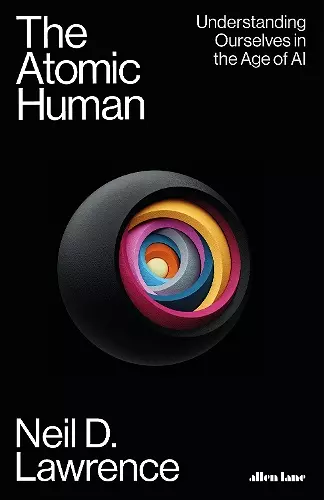The Atomic Human
Understanding Ourselves in the Age of AI
Format:Hardback
Publisher:Penguin Books Ltd
Published:6th Jun '24
Currently unavailable, our supplier has not provided us a restock date
This hardback is available in another edition too:
- Paperback£12.99(9781802062106)

‘The clarity, authority, wit and insight Lawrence brings to bear are like torches shining into the turbulent darkness of a subject we all wonder at, but which we mostly feel unable to even to think or talk about with any confidence. Hugely recommended’ Stephen Fry
What does Artificial Intelligence mean for our identity? Our fascination with AI stems from the perceived uniqueness of human intelligence. We believe it's what differentiates us. Fears of AI not only concern how it invades our digital lives, but also the implied threat of an intelligence that displaces us from our position at the centre of the world.
Neil D. Lawrence's visionary book shows why these fears may be misplaced. Atomism, proposed by Democritus, suggested it was impossible to continue dividing matter down into ever smaller components: eventually we reach a point where a cut cannot be made (the Greek for uncuttable is 'atom'). In the same way, by slicing away at the facets of human intelligence that can be replaced by machines, AI uncovers what is left: an indivisible core that is the essence of humanity.
Human intelligence has evolved across hundreds of thousands of years. Due to our physical and cognitive constraints over that time, it is social and highly embodied. By contrasting our capabilities with machine intelligence, The Atomic Human reveals the technical origins, capabilities and limitations of AI systems, and how they should be wielded. Not just by the experts, but ordinary people. Understanding this will enable readers to choose the future we want – either one where AI is a tool for us, or where we become a tool of AI – and how to counteract the digital oligarchy to maintain the fabric of an open, fair and democratic society.
expertly explains the capabilities — and limitations — of machine intelligence * Financial Times, best summer books of 2024 *
The clarity, authority, wit and insight Lawrence brings to bear are like torches shining into the turbulent darkness of a subject we all wonder at, but which we mostly feel unable to even to think or talk about with any confidence. Hugely recommended -- Stephen Fry
fascinating debut book -- Andrew Robinson * Nature *
for anyone and everyone who is interested in what makes humans different from machines by one of the world’s experts in AI research. Understanding the differences more may help us live in harmony alongside very intelligent machines so that we can worry less about existential threats and more about how we work with intelligent machines to make the world a better place -- Dame Wendy Hall, co-author of Four Internets
According to Professor Neil Lawrence, all of us suffer from locked-in syndrome … I have been gripped by this insight. Lawrence’s book concludes that whatever AI becomes, and whether or not it ultimately poses a threat to our species, it will never replicate or penetrate the essence of what it means to be human … To be a human is, indeed, to be locked in. But it is in our struggle against inarticulacy that we find our deepest voice and highest meaning -- Matthew Syed * The Sunday Times *
A brilliant technological and philosophical tour de force by one of the world’s foremost authorities on the world of AI and machine learning … at once fascinating, entertaining, and a deeply serious study on one of the most consequential emerging technologies humans have ever developed. Lawrence … argues machines and AI are viewed and used as tools to assist humans and we must never concede control of fundamental decisions of great consequence. A great book by an obviously brilliant author -- Mark A. Milley, General, US Army (Ret), 20th Chairman, US Joint Chiefs of Staff
This is an utterly absorbing account of humans, computers, and how much they differ. It explains why AI cannot substitute for human intelligence even as machine intelligence poses enormous challenges for how information is used and societies are organised -- Dame Diane Coyle, author of Cogs and Monsters
The intellectual sweep of Sapiens focused on understanding and contrasting human and machine intelligence and what this means for society. Professor Lawrence invites the general reader to join him in the debate, effortlessly bridging C. P. Snow’s ‘two cultures’ with lucid accessible explanations of key concepts from mathematics and computer science and resonant human and cultural stories by way of Democritus, Ernest Hemingway and the information contained in our assumptions about what car his mother drives -- Dr Jean Innes, CEO The Alan Turing Institute
An enlightening read on AI. Lawrence reminds us that brilliant story telling is the human way to communicate at scale given our otherwise structurally low bandwidth. My main take away is the importance of the difference between intelligence as a property rather than intelligence as an entity -- Lord Petitgas, UK Prime Minister’s Special Adviser on Business and Investment
Neil Lawrence is one of the world’s foremost authorities on AI and one of the few who has deployed AI in large-scale industrial systems. He is also a rare technical leader who understands AI as part of a long evolution of human beings interacting with other intelligences in a cognitive landscape. In this thoughtful and engaging book – ranging from James Watt’s steam engines to World War II gunners and the Apollo lunar landings – Lawrence shows us what’s novel and what’s human about AI. A must read for anyone seeking to understand AI’s place in our world and how to harness it for human flourishing -- David A. Mindell, Dibner Professor of the History of Engineering and Manufacturing, and Professor of Aeronautics and Astronautics, MIT
ISBN: 9780241625248
Dimensions: 242mm x 162mm x 40mm
Weight: 672g
448 pages